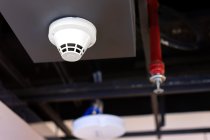A Guide to Your Home's Circuit Breaker Panel

August 19, 2025
A Guide to Your Home's Circuit Breaker Panel
Home electrical systems can undergo various high-voltage power surges and energy spikes. Your home circuit breaker panel is a helpful yet powerful piece of equipment that can save your appliances from sudden failure and explosion caused by excess electricity flow. It also safeguards your family against electrical shock. But to maximize the benefits of a home circuit breaker panel and protect all your electronic devices, you need to know the basics of circuit breakers, their working mechanism, and precautions you should take while handling them. A professional electrician should be called to work on any circuit breaker panel needs. Neighborhood Electric can help with any circuit breaker needs.
Are Circuit Breaker Brands Interchangeable?
Yes, circuit breakers are interchangeable. All circuit breakers have a rating that indicates the maximum current they can handle. If you install a breaker with a higher rating than what’s already there, it will work just fine. However, it is not recommended to use a smaller-rated breaker because it may not be able to handle the load.
How Do Circuit Breakers Work?
Circuit breakers are devices that prevent electrical fires by interrupting the flow of electricity when the current reaches unsafe levels. They do so by opening an internal switch that breaks the circuit and stops power from flowing through the wires. This prevents further damage from occurring before a professional electrician can repair it.
What Circuit Breaker Do I Need?
Most homes have single-pole circuit breakers, meaning they will only work properly if installed in one position on the breaker box panel. Double-pole circuit breakers can be installed in two different positions on a panel, allowing you to use more than one outlet at once if needed. When selecting a double-pole circuit breaker, buy one with enough capacity for all the outlets being used simultaneously.
Standard Circuit Breakers
These are typically used for lighting and small appliances such as microwaves, coffee makers, and hair dryers. They come in single-pole or double-pole configurations, depending on how many circuits you need to protect at once.
Single-Pole
Single-pole breakers are used in homes with only one set of wires (like an outlet).
Double-Pole
Double-pole breakers are used in homes with two sets of wires running through them (like two outlets).
GFCI Circuit Breakers
Ground fault circuit interrupters (GFCIs) can detect faulty wiring within seconds, preventing fires caused by electrical shock or electrocution. GFCIs are designed to shut down when there's an imbalance between the current traveling through a conductor and the return current through another conductor or ground wire. The grounded conductor is a reference point for all other conductors in your home's electrical system.
AFCI Circuit Breakers
AFCI (Arc Fault Circuit Interrupter) circuit breakers sense abnormal current flow in an electric circuit. If it senses a dangerous electrical arc, it automatically trips the breaker, stopping power from flowing to the circuit.
CAFCI Circuit Breakers
CAFCI (Combination Arc Fault Circuit Interrupter) is a newer technology that combines AFCI protection with traditional overload protection into one device. A CAFCI will trip when current flows through both a ground fault and an arc fault condition in a small window of time after they occur simultaneously. They are required by code in bathrooms and kitchens where water can be present when electricity is on (such as dishwashers and garbage disposals).
Why Do Circuit Breakers Trip
Several different factors can cause a circuit breaker to trip. These include:
- Electrical Causes
- Can a Circuit Breaker Go Bad
- Electrical Causes
- Old Age
- Physical Causes
What Is The Life Expectancy Of a Circuit Breaker?
There are two main types of circuit breakers: thermal and magnetic. Magnetic breakers are used in older homes with a typical lifespan of 30-40 years. Thermal breakers are more common today, lasting between 20-30 years. It's important to note that when replacing your circuit breakers, you should only use the same type (magnetic or thermal) as your original ones because there are different components inside each type of breaker that will not work properly with another type.
Neighborhood Electric
Before attempting to replace your panel, you should turn the power off and ensure your work area is clear of any possible dangers. You should also double-check the requirements for how many circuit breakers you will need in a replacement home's panel. The most important thing is to get a qualified electrician from Neighborhood Electric to provide proper wiring and circuit breaker replacement.








